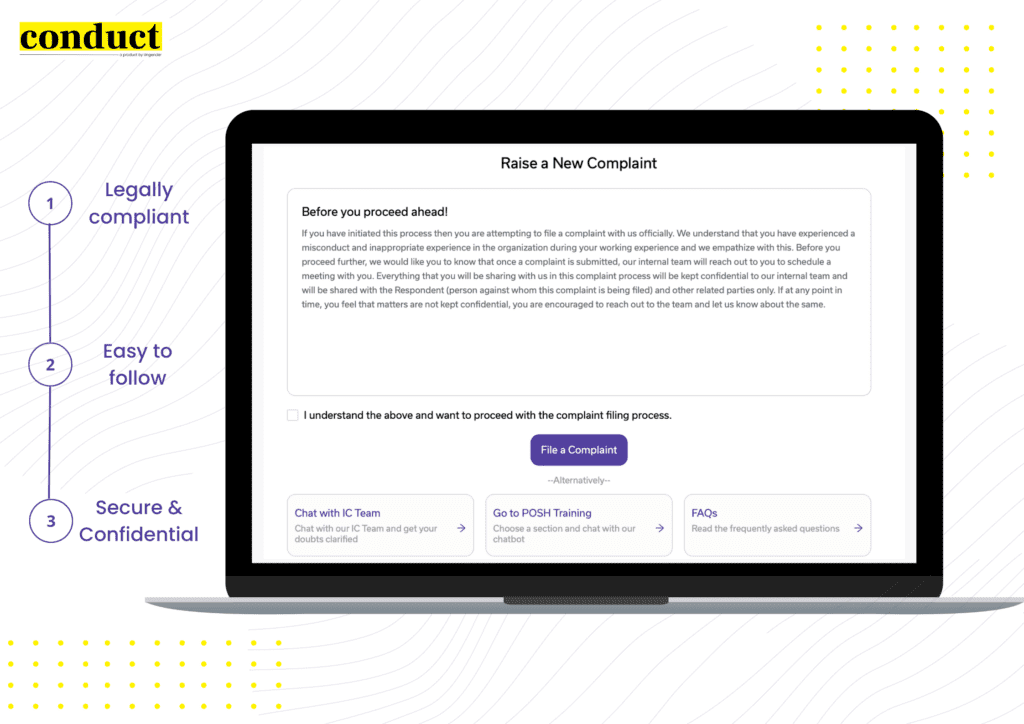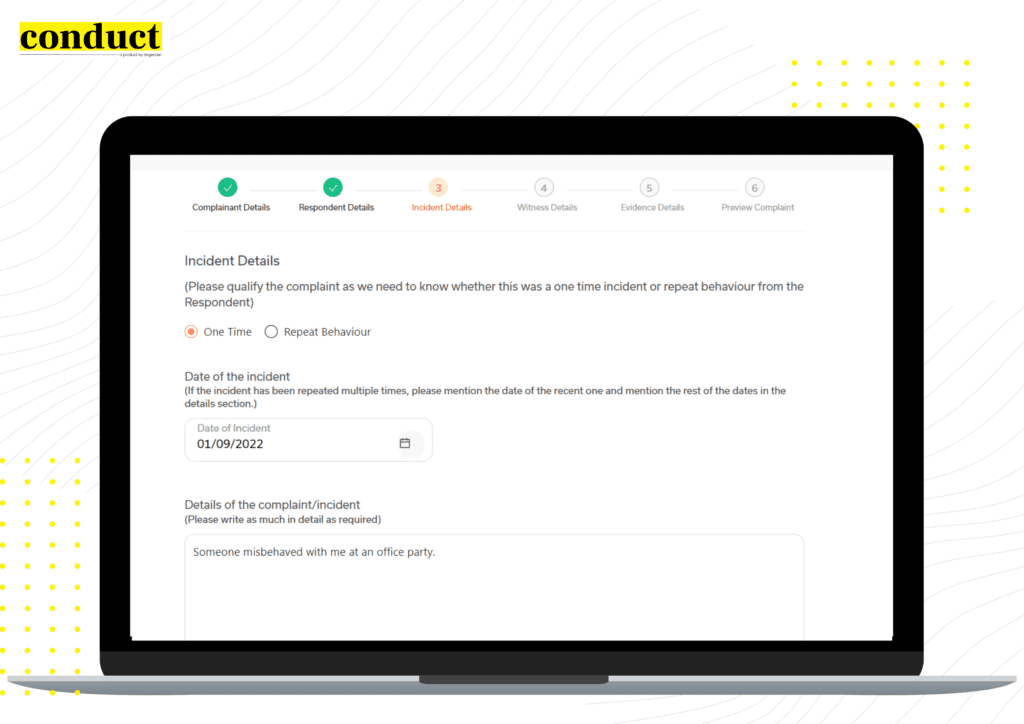Reporting workplace harassment has become important as the COVID-19 pandemic has forced companies to adopt remote work and hybrid team structures. However, addressing workplace sexual misconduct has also become challenging. In addition, with many companies operating in a global environment, there are cultural and legal differences that make it even more difficult to navigate these issues.
As a result, having a centralized incident reporting tool for workplace sexual misconduct is crucial. In this article, we will explore the importance of having a centralized incident reporting tool, the gaps that currently exist, and the financial risks associated with not having one.
Transform your workplace culture with our centralized incident reporting system
Why do employees refrain from reporting workplace harassment?
Reporting workplace harassment can be a difficult and daunting experience for employees. Many factors may contribute to employees’ reluctance to report incidents of harassment, such as fear of retaliation, lack of trust in their employer or HR department, normalization of harassment within the workplace, embarrassment or shame, and fear of not being believed. Let’s dive a bit deeper into each of these:
Fear of retaliation: Employees may worry that reporting harassment will result in negative consequences, such as being fired or demoted, or being treated unfairly by their employer or colleagues.
Lack of trust: Employees may not trust their employer or HR department to handle the situation properly, especially if the harasser is a higher-up or if there have been previous incidents of harassment that were not addressed.
Normalization of harassment: In some workplaces, harassment may be seen as a “normal” part of the culture, making employees feel like reporting it would not lead to any real change.
Embarrassment or shame: Employees who experience harassment may feel embarrassed or ashamed to report it, especially if the harassment is sexual in nature.
Fear of not being believed: Employees may worry that their employer or HR department will not believe their claims of harassment, especially if there is no physical evidence or witnesses.

Find out more about how retaliation affects reporting sexual harassment at workplace
How does a centralized system for reporting workplace harassment help?
A centralized incident reporting system can help overcome some of the problems associated with reporting workplace harassment. By providing a secure and confidential way for employees to report incidents of harassment, a centralized system can help to reduce the fear of retaliation or negative consequences. This can help employees to feel more comfortable coming forward with their experiences.
A centralized incident reporting system can also help to build trust between employees and their employers. By providing a clear and transparent process for handling reports of harassment, employees can feel confident that their employer takes the issue seriously and will take appropriate action. This can help to address any concerns around a lack of trust in the employer or HR department.
In addition, a centralized system can help to break down any normalization of harassment within the workplace. By providing a clear process for reporting incidents and a clear message that harassment will not be tolerated, a centralized system can help to shift the culture of the workplace towards one of respect and safety.
Finally, a centralized incident reporting system can help to address any concerns around embarrassment or fear of not being believed. By providing a confidential way to report incidents, employees can feel more comfortable sharing their experiences without fear of judgment or disbelief.
Overall, a centralized incident reporting system can help to encourage reporting workplace harassment by providing a safe, confidential, and transparent process for employees to report incidents, and by helping to address some of the common concerns that may prevent employees from coming forward.
Transform your workplace culture with our centralized incident reporting system
Gaps in the current system for reporting workplace harassment
Despite the importance of a centralized incident reporting tool, many companies still do not have one in place. Some of the gaps that currently exist include:
Lack of awareness: Many employees are not aware of the incident reporting process or are hesitant to report incidents due to fear of retaliation.
Fragmented reporting: In many cases, incidents of sexual misconduct are reported to multiple departments or individuals within the company, leading to a fragmented reporting process.
Inconsistent investigation: Without a centralized incident reporting tool, investigations of incidents of sexual misconduct may be inconsistent or incomplete.
Limited access: Employees working remotely or in different locations may not have access to the incident reporting tool, making it difficult for them to report incidents.

Business risks of not having a centralized system
The financial risks of not having a centralized incident reporting tool can be significant. These risks can include:
Legal liability: Companies that do not have a centralized incident reporting tool may be at risk of legal liability if they are found to have failed to address incidents of sexual misconduct.
Reputational damage: Incidents of sexual misconduct can result in significant reputational damage for companies. This can lead to a loss of customers, investors, and talent.
Employee turnover: Employees who experience or witness incidents of sexual misconduct may be more likely to leave the company, resulting in increased turnover and associated costs.
Decreased productivity: Incidents of sexual misconduct can lead to decreased productivity and morale among employees, resulting in decreased revenue and increased costs.
Learn how neglecting workplace sexual harassment can cause your business to suffer
In today’s global and remote work environment, it is more important than ever to have a centralized incident reporting tool for workplace sexual misconduct. A centralized incident reporting tool helps to ensure consistency, confidentiality, compliance, and risk management. However, there are gaps in current incident reporting systems, and the financial risks of not having a centralized tool can be significant. Companies should prioritize implementing a centralized incident reporting tool to help prevent workplace sexual misconduct and protect their employees, reputation, and bottom line.
How can Ungender help you?
Use Ungender’s incident reporting system, Conduct, to expose and reduce workplace misconduct incidents that previously went unreported. Ensure your organization is in compliance with the PoSH Act and is behaving ethically.
Conduct lets your team raise a legally valid complaint against workplace sexual harassment. Your team can use Conduct to report the ‘When, Where, and Who’ of an incident through a guided 6-step process. Its reporting mechanism is confidential and leaves no room for the incident to become office gossip.
Hotlines, written complaints, and anonymous surveys are futile solutions. Start taking a proactive approach towards laying down the foundations of a safe and compliant workplace for your team.
Transform your workplace culture with our centralized incident reporting system
Author: Pallavi Pareek is the Founder and MD of Ungender. She is an expert in the field of workplace sexual harassment and building diverse and inclusive workplaces. Pallavi is also the leading advisor, trainer, consultant, and external member for some of India’s biggest organizations in these matters. Her approach is grounded in research, and she draws upon the latest insights and best practices to inform her work.










